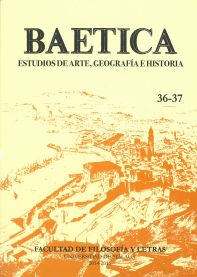Frauds around the right of the Lyon’s bourgeoisie (17th-18th centuries)
DOI:
https://doi.org/10.24310/BAETICA.2015.v0i36-37.160Keywords:
Lyon, Bourgeoisie, Nobility, Fraud, Family strategyAbstract
Strongly desired, the bourgeoisie of Lyon guaranteed an full exemption of the taille, a royal tax over rural properties, as well as the right of selling wine free of duties in urban wine-shops. These privileges could be obtained either by beeing born in Lyon, either by giving proofs of a long residentship inside the town. Defrauders used a lot of stratagems. Some of them were committing bribery, had fictive residences or produced forgeries. Others followed strategies aiming to transfer patrimony towards a young migrant intentionally sent in Lyon. Even members of the nobility were asking for a favour in view of becoming bourgeois.Downloads
Metrics
References
DURAND, G. (1979), Vin, vignes et vignerons en Lyonnais et Beaujolais, Presses universitaires de Lyon, Lyon.
ESMONIN, E. (1913), La taille en Normandie au temps de Colbert (1661-1683), Hachette, Paris.
GUTTON, J-P. (1992), L’Intendance de Lyonnais, Beaujolais, Forez en 1698 et en 1762. Édition critique du mémoire rédigé par Lambert d’Herbigny et des observations et compléments de La Michodière, Éditions du CTHS, Paris.
PERROT, J.-Cl. (1975), Genèse d’une ville moderne: Caen au XVIIIe siècle, Mouton, Paris.
ZELLER, O. (2003), Historia de la Europa urbana. La ciudad moderna, Publicacions Universitat de València, València.
Downloads
Published
How to Cite
Issue
Section
License
This journal provides immediate free access to its content on the principle of making research freely available to the public. All content published in Baetica. Modern and Contemporary History Studies are subject to the Creative Commons Acknowledgment-NoCommercial-ShareAlike 4.0 license, the full text of which can be found at <http://creativecommons.org/licenses/by-nc-sa/4.0>
They may be copied, used, disseminated, transmitted and publicly displayed, provided that:
The authorship and the original source of its publication (magazine, publisher and URL of the work) must be cited.
They are not used for commercial purposes.
The existence and specifications of this use license are mentioned.
Copyrights are of two kinds: moral and patrimonial. Moral rights are perpetual, inalienable, non-transferable, inalienable, unattachable and imprescriptible prerogatives. In accordance with copyright legislation, BAETICA. Estudios de Historia Moderna y Contemporánea recognizes and respects the moral right of the authors, as well as the ownership of the patrimonial right, which will be transferred to the University of Malaga for its open access dissemination. Economic rights refer to the benefits obtained from the use or disclosure of works. BAETICS. Estudios de Historia Moderna y Contemporánea is published in open access and is exclusively authorized to carry out or authorize by any means the use, distribution, disclosure, reproduction, adaptation, translation or transformation of the work.
It is the responsibility of the authors to obtain the necessary permissions of the images that are subject to copyright.
Authors whose contributions are accepted for publication in this journal will retain the non-exclusive right to use their contributions for academic, research, and educational purposes, including self-archiving or deposit in open access repositories of any kind.
The electronic edition of this magazine is edited by the Editorial of the University of Malaga (UmaEditorial), being necessary to cite the source in any partial or total reproduction.







2.png)
